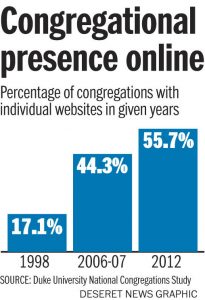Just about every church has a website by now, right?
Not exactly…
Several weeks ago, I received a call from Kelsey Dallas, columnist for the Deseret News, a Utah-based news organization that focuses on issues related to family the and faith. She was investigating a 2012 Duke University National Congregations Study that showed a shocking low percentage of U.S. congregations. How low?
Granted, the study was conducted in 2012, so it’s 2-3 years old. However, considering the fact that the percentage of churches with websites only grew 11% in previous 5 years (from 44.3% in 2007), we can extrapolate that the current percentage isn’t likely to be more than 60-65%
Kelsey writes…
Congregational websites, like those for colleges or businesses, can be a valuable advertising tool. Besides communicating basic information like worship times, they tell the story of the faith community, displaying goals and core beliefs.
But even though websites are essentially free to build through sites like WordPress or Blogger, their maintenance requires time and energy, resources that are already in short supply in small faith communities.
As a result, online presence has become a dividing line between American congregations, helping larger communities keep growing, while others risk obscurity in a digital age.
I think she’s right.
You might also be surprised to know some statistics about the size of churches in the U.S.
- 59% of churches have a weekly attendance less than 100 people
- 16% of church attenders attend a congregation of less than 100 people.
In other words, the majority of churches in the U.S. are small, but because 86% of worshipers attend larger churches, most people don’t realize it. (source)
In the article Kelsey shares details of an interview she conducted with the pastor of a church that doesn’t have a website:
Cindy Wells Hayes, who has served as Thomaston UMC’s pastor since September, said she recognizes that a website could improve the congregation’s ability to attract new members, noting that an online presence is an important part of appearing healthy and thriving to outsiders…
[She] described designing a website as an ongoing project, noting that her predecessor began planning one this summer, she does worry that Thomaston UMC’s 20 regular members are already “stretched thin.” Adding website upkeep to the community’s weekly responsibilities could overburden them.
It may sound like a situation where “the rich get richer while the poor get poorer” or perhaps more accurately “the big get bigger while the small get smaller,” but
it doesn’t have to be that way…
I don’t think it’s a money issue, as we here at OurChurch.Com can provide a website with no ads on it and a domain name for about $10 a month.
All it takes is one person who is willing to put in a few hours to get the website started and an hour or so a week to update it, and that website can make all the difference in the world in that congregations ability to connect with people in the community looking for a church.
I believe it’s an issue of action and determination.
If you’re in a congregation that still doesn’t have a website, do you care enough about your church and the people in the community who you are trying to reach to do something about?
You can read the full article including a few quotes from me that made it.
What do you think? Do churches not have a website because their small or to are churches small because they don’t have a website? Or is it something else entirely?



2 Comments
Paul, I appreciate the service you and your team are bringing to churches. I found this article because I was looking to find out (roughly) how many churches don’t have a site and (of course) started reading some of your other articles.
Given that this was posted about 4 years back, and that this is the main driving force behind what we do, I was wondering if you had some more recent stats? This seems to be a critical article.
Hi Gordon, good question. I found this study done by LifeWay in 2017 that indicates 84% of protestant churches have a website. http://lifewayresearch.com/wp-content/uploads/2018/01/Sept-2017-Pastor-Views-on-Technology.pdf